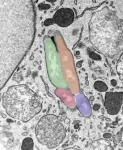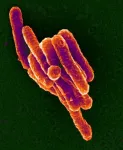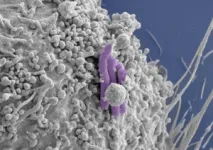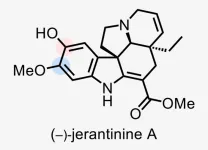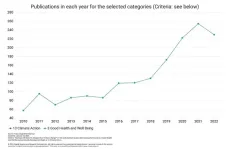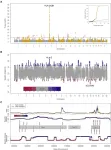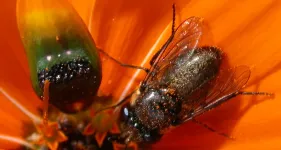(Press-News.org) Francis Crick Institute press release
Under strict embargo: 16:00 GMT 23 March 2023
Peer reviewed
Experimental study
Human stem cells
Researchers at the Francis Crick Institute have found that the body’s process of removing old and damaged cell parts, is also an essential part of tackling infections that take hold within our cells, like TB.
If this natural process can be harnessed with new treatments, it could present an alternative to, or improve use of antibiotics, especially where bacteria have become resistant to existing drugs.
In their study, published in Nature Microbiology today, ahead of World TB Day on the 24th March, the team studied genes key to bacteria’s ability to evade autophagy, a pathway that cells use to destroy themselves when they are under stress or infected.
They engineered human immune cells called macrophages from specialist stem cells called induced pluripotent stem cells, which have the ability to become any cell type in the body. They then used genome editing tools to manipulate the macrophages ability to perform autophagy. When genes key to autophagy were removed and the cells were infected with Mycobacterium tuberculosis (bacilli that cause TB), the bacterial infection took hold, replicating more within the engineered cells and causing mass host cell death.
These results are evidence for a strong role of autophagy in controlling intracellular infections like TB. If this pathway can be boosted or strengthened, it could be a new avenue for tackling antibiotic resistance, by making existing antibiotic drugs more effective or presenting an alternative to drugs in cases where bacteria have evolved resistance.
Max Gutierrez, head of the Host-Pathogen Interactions in Tuberculosis Laboratory at the Crick, said: “I first studied the role of autophagy in infection during my PhD, so it’s incredible to see renewed interest in this field. Using the latest technologies, we’ve been able to show a key role for this pathway in controlling infection.
“As immunotherapies have harnessed the immune system to fight cancer, boosting this immune defence with a host-directed therapy, could be a valuable new tool in the fight against infections, particularly those becoming resistant to antibiotics.”
The team also validated their results using macrophages isolated from blood samples, confirming the importance of autophagy in human defences.
Beren Aylan, joint first author and PhD student at the Crick together with Elliott Bernard and Enrica Pellegrino, said: “Antibiotic resistance is a huge threat to our health so it’s incredibly important to understand how our bodies fight infection and where there might be room for improvement.
“TB is a great example of where targeting our own immune defences could be really effective, because it takes a very long course of different antibiotic treatments to effectively remove the infection. Anything that can be done to more effectively remove bacteria, could also make a huge difference to the cost and accessibility of treatments.”
The team are now planning to screen for drug compounds that could be used to boost autophagy in a targeted way.
“Boosting the autophagy pathway isn’t as simple as it might seem,” adds Max. This is because all parts of the body use autophagy as a way to recycle old and damaged cells. In order to safely increase autophagy in the location of infections, we need to target the pathway in macrophages alone.”
-ENDS-
For further information, contact: press@crick.ac.uk or +44 (0)20 3796 5252
Notes to Editors
Reference: Aylan, B. et al. (2023). ATG7 and ATG14 restrict cytosolic and
phagosomal M. tuberculosis replication in human macrophages. Nature Microbiology. http://dx.doi.org/10.1038/s41564-023-01335-9
The Francis Crick Institute is a biomedical discovery institute dedicated to understanding the fundamental biology underlying health and disease. Its work is helping to understand why disease develops and to translate discoveries into new ways to prevent, diagnose and treat illnesses such as cancer, heart disease, stroke, infections, and neurodegenerative diseases.
An independent organisation, its founding partners are the Medical Research Council (MRC), Cancer Research UK, Wellcome, UCL (University College London), Imperial College London and King’s College London.
The Crick was formed in 2015, and in 2016 it moved into a brand new state-of-the-art building in central London which brings together 1500 scientists and support staff working collaboratively across disciplines, making it the biggest biomedical research facility under a single roof in Europe.
http://crick.ac.uk/
END
The Francis Crick Institute press release
Under strict embargo: 16:00 GMT Thursday 23rd March
Peer reviewed
Experimental
Cells
Researchers at the Francis Crick Institute have uncovered a key role for a new type of cell in touch detection in the skin of the fruit fly.
Touch allows animals to navigate their environment by gathering information from the outside world. In their study published today in Nature Cell Biology, Dr Federica Mangione and Dr Nicolas Tapon shed light on how touch-sensitive organs assemble during development.
In particular the team studied the development ...
A protein complex prevents the repair of genome damage in human cells, in mice and in the nematode Caenorhabditis elegans, a team of researchers at the University of Cologne has discovered. They also successfully inhibited this complex for the first time using a pharmaceutical agent.
“When we suppress the so-called DREAM complex in body cells, various repair mechanisms kick in, making these cells extremely resilient towards all kinds of DNA damage,” said Professor Dr Björn Schumacher, Director of the Institute for Genome Stability in Aging ...
Plants produce all types of curious chemicals. Some deter predators. Some smell wonderful. Some even have medicinal value. One of these hidden gems is (–)-jerantinine A (JA), a molecule with remarkable anticancer properties, produced by a plant called Tabernaemontana corymbosa. Unfortunately, access to this Malaysian jungle plant and its promising chemical compound has been limited. Until now.
Cold Spring Harbor Laboratory (CSHL) chemists, led by Professor John E. Moses, have created a way to safely, quickly, and sustainably synthesize JA in the lab. To cancer biologists at CSHL, this breakthrough could mean future ...
Whether it’s diseases from bats, birds, pigs, or mosquitoes, climate change brings with it an increased risk of animal-borne (or “zoonotic”) diseases that can transmit to humans.
Digital Science, a technology company serving stakeholders across the research ecosystem, has today released its analysis of the global research response to climate change and zoonotic diseases, in the context of the United Nations’ Sustainable Development Goals (SDGs) on climate and health.
Using data from Dimensions, Dr Briony Fane, Ann Campbell and Dr Juergen Wastl from Digital Science have explored published research, ...
Researchers have used pluripotent stem cells to make thymus organoids that support the development of patient-specific T-cells, researchers report March 23rd in the journal Stem Cell Reports. The proof-of-concept work provides the basis for studying human thymus function, T-cell development, and transplant immunity.
“We have established the framework for further basic science and translational research interrogating human thymus development and function in vitro, and in a patient-specific manner,” says senior author Holger Russ, of the University ...
When early Stone Age farmers first moved into Europe from the Near East about 8,000 years ago, they met and began mixing with the existing hunter-gatherer populations. Now genome-wide studies of hundreds of ancient genomes from this period show more hunter-gatherer ancestry in adaptive-immunity genes in the mixed population than would be expected by chance.
The findings, reported in Current Biology on March 23, suggest that mixing between the two groups resulted in mosaics of genetic variation that were acted upon by natural selection, a process through which all organisms, including humans, adapt and change ...
A male fly approaches a flower, lands on top of what he thinks is a female fly, and jiggles around. He’s trying to mate, but it isn’t quite working. He has another go. Eventually he gives up and buzzes off, unsuccessful. The plant, meanwhile, has got what it wanted: pollen.
A South African daisy, Gorteria diffusa, is the only daisy known to make such a complicated structure resembling a female fly on its petals. The mechanism behind this convincing three-dimensional deception, complete ...
Francis Crick Institute press release
Under strict embargo: 15:00hrs GMT 23 March 2023
Peer reviewed
Observational study
People
Research from the Francis Crick Institute published today in Current Biology has revealed that diversity in genes coding for immunity may have facilitated adaptation to farming lifestyles in prehistoric periods.
Researchers at the Ancient Genomics Laboratory at the Crick studied available genome-wide DNA from 677 individuals dating to Stone Age Europe, spanning the movement of Neolithic farmers from the Near East into Europe about 8000 years ago, where they mixed with Mesolithic hunter-gatherers already in Europe.
They were interested in whether ...
Being vaccinated against Covid halves people’s risk of developing long Covid, according to new research from the University of East Anglia.
Long Covid still affects some two million people in the UK, and new research published today reveals the risk factors associated with developing the condition.
Overweight people, women, smokers and those over the age of 40 are also more likely to suffer from long Covid according to the study - which includes more than 860,000 patients and is thought to be the largest of its kind.
The study also finds that co-morbidities such as asthma, COPD, Type 2 Diabetes, coronary heart disease, immunosuppression, anxiety ...
About The Study: This systematic review and meta-analysis of 41 studies including 860,000 patients found that certain demographic characteristics (e.g., age and sex), comorbidities, and severe COVID-19 were associated with an increased risk of post−COVID-19 condition (PCC; also known as long COVID), whereas vaccination had a protective role against developing PCC sequelae. These findings may enable a better understanding of who may develop PCC and provide additional evidence for the benefits of vaccination.
Authors: Vassilios ...
